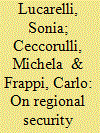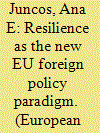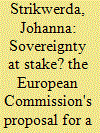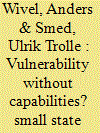|
|
|
Sort Order |
|
|
|
Items / Page
|
|
|
|
|
|
|
| Srl | Item |
| 1 |
ID:
151393


|
|
|
|
|
| Summary/Abstract |
This article introduces an argument for how institutional memory of crisis management operations develops in North Atlantic Treaty Organization (NATO). Scholars of European security and of international organisations have examined organisational learning, but have yet to explain its precondition: institutional memory. In a context of increasing turnover due to defence budget cuts, it remains unclear how shared knowledge of strategic errors is acquired. This article finds that the NATO secretariat facilitates practitioners’ use of informal processes for contributing to institutional memory in response to the constraints of existing formal learning processes. These formal processes, including a lessons learned centre and a lessons learned database, inadvertently disincentivise practitioners from contributing such knowledge as using them can incur reputational costs. Drawing on NATO documentation and interviews with 27 NATO elite practitioners, the paper provides evidence that practitioners instead share knowledge through three informal processes: interpersonal communications, private documentation and crisis simulations.
|
|
|
|
|
|
|
|
|
|
|
|
|
|
|
|
| 2 |
ID:
151390


|
|
|
|
|
| Summary/Abstract |
Already introduced to the academic and political debate some years ago, the concept of “security governance” still needs to be clarified. In particular, four main shortcomings need to be overcome to make the concept more useful for an assessment of current security dynamics: in the first place, attention has been devoted more to “governance” than to “security”, while failing to consider the role of the understandings and perceptions of the actors involved in the governance system. Second, the literature on the actors (governmental or not) involved is still fragmented. Third, the literature on security governance has too often been detached from reflections on regionalism, while it would be useful to further explore the relationship between cognitive definitions of regional and security dynamics. Fourth, the literature has predominantly focused on Europe and the transatlantic area, overlooking processes of “region-building” in security terms in other “unexpected” geographical spaces. After proposing avenues to overcome the current gaps in the literature, the Southern Caucasus is chosen as a case study to show the different instances of security governance emerging, thanks to definitions of the region in security terms that have involved regional and external actors, of a state and non-state nature.
|
|
|
|
|
|
|
|
|
|
|
|
|
|
|
|
| 3 |
ID:
151387


|
|
|
|
|
| Summary/Abstract |
This article examines the rise of resilience discourses in EU foreign policy. The European Union Global Strategy (EUGS) refers to building state and societal resilience in its neighbourhood as one of the key strategic priorities of the EU. This article argues that the discourse of resilience that permeates the EUGS chimes well with a pragmatist turn in social sciences and global governance. The EUGS introduces resilience-building alongside an emphasis on flexibility, tailor-made approaches and the need for local ownership, capacity-building and comprehensiveness. More importantly, the new EUGS proposes “principled pragmatism” as a new operating principle in its foreign policy. While this might suggest a more pragmatic EU foreign policy, a closer examination of the EUGS discourse reveals significant tensions between a pragmatic and a principled foreign policy, which undermine the added value of resilience-building as a new foreign policy paradigm.
|
|
|
|
|
|
|
|
|
|
|
|
|
|
|
|
| 4 |
ID:
151388


|
|
|
|
|
| Summary/Abstract |
The Defence and Security Procurement Directive (DSDP) is the first supranational policy in the Common Security and Defence Policy (CSDP) and represents a departure from the standard understanding of the CSDP as intergovernmental. Whilst the member states were initially against such an initiative, the Defence Directive was eventually proposed in the Council in 2007 and accepted in July 2009. This paper examines why European Union member states changed their position on the proposal for a DSDP between 2004 and 2007. The analysis builds upon two hypotheses that aim to account for this change in position. Providing new insight into the views of the member states, the study finds that the member states accepted the Directive due to a sense of obligation to respect internal market rules, and further discusses the theoretical implications of these findings.
|
|
|
|
|
|
|
|
|
|
|
|
|
|
|
|
| 5 |
ID:
151392


|
|
|
|
|
| Summary/Abstract |
This article analyses the US–EU transatlantic dialogue on the Iranian nuclear dossier with a particular view to the implications for EU foreign policy on Iran. Doing so, it uses neo-Gramscian scholarship to put the EU’s “over-compliance” with Iran sanctions into perspective. Constrained by the imperatives of hegemonic coercion in the form of US financial Iran sanctions against third country entities and with the hegemonic consent of a Western US-led “historic bloc”, Europe was relegated to a subaltern below its mediatory potential. It will be shown how this finding complicates the EU’s ambition to renew relations with Iran. Drawing on semi-structured interviews with experts and delegation members from the P5+1, this article thus analyses “the normative element” in the transatlantic security dialogue on Iran at a time where the latter is undergoing a sea change in the wake of the implementation of the “Joint Comprehensive Plan of Action” of July 2015.
|
|
|
|
|
|
|
|
|
|
|
|
|
|
|
|
| 6 |
ID:
151391


|
|
|
|
|
| Summary/Abstract |
Today, small European states regularly need to go out of area and out of tried and tested institutional settings to defend their security interests. How do small European states meet this challenge most effectively? This analysis suggests that small states can influence multilateral decisions on international security by combining norm entrepreneurship with lobbying and taking on the role as an “honest broker”. However, economic capacity, an effective state administration, and interests compatible with the agendas of the great powers are key to success. Based on a comprehensive empirical material including 19 elite interviews as well as official documents and other written material, we process trace how one small European state, Denmark, influenced the development of international counter-piracy cooperation and the development of an international counter-piracy strategy for the Gulf of Aden and off the Horn of Africa and discuss which lessons the Danish case may hold for other small states.
|
|
|
|
|
|
|
|
|
|
|
|
|
|
|
|
| 7 |
ID:
151389


|
|
|
|
|
| Summary/Abstract |
This article contributes to the literature on the European border security industry with a network analysis of a new bipartite data set. The network is composed of speakers and their speech topics at a European border security conference taking place from 2008 to 2015. Speakers are linked to conferences by year of attendance and to speech topics to identify key actors and discourses using measures of centrality. A multiple regression quadratic assignment procedure (MR-QAP) is used to explain the continuity of conference speech topics. The centrality analysis reveals a number of “hubs” and the discourse analysis reveals a consistent focus on social control and surveillance over human rights. The MR-QAP regression suggests that shared discourses are driven by organisations which act as key speakers at many events, and whose discourses are prioritised over those of other actors. The article concludes with notes on the critical implications of the findings.
|
|
|
|
|
|
|
|
|
|
|
|
|
|
|
|
|
|
|
|
|